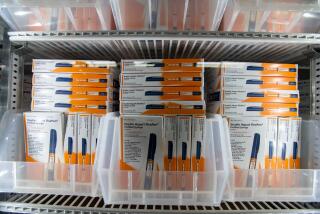Suits Target Pricing of Cancer Drug
- Share via
A coalition of consumer groups continued its legal offensive against the pharmaceutical industry Wednesday, asserting in lawsuits that AstraZeneca and Barr Laboratories conspired to inflate the price of the widely used breast cancer drug tamoxifen.
The suits, filed in federal court in New York and seven state courts around the country, are part of a broader assault that has turned the drug industry into a magnet for class actions.
Within the last few weeks, the same consumer coalition sued Bristol-Myers Squibb over tactics used to prevent cheaper knockoffs of its anti-anxiety medication, BuSpar. Bruce Livingston, executive director of San Francisco Senior Action Network, a plaintiff, said lawsuits are being planned against other pharmaceutical firms.
“This is part of a series of lawsuits,” said Livingston, whose organization represents 29,000 people. “We need to stop the tendency of the industry to cut deals and control price.”
The suits filed Wednesday allege that a 1993 settlement of patent litigation between AstraZeneca and Barr was a collusive agreement. Barr dropped its legal efforts to bring out a low-cost generic version of tamoxifen. In return, AstraZeneca paid Barr $21 million and allowed Barr to sell in the United States an unbranded version of tamoxifen manufactured by AstraZeneca.
But, according to the suit, Barr’s version of tamoxifen is only 5% cheaper than AstraZeneca’s branded product, sold under the name Nolvadex. Generic versions of drugs typically sell for 30% to 80% less, according to the plaintiffs.
Barr sold $350 million of the drug last year, while AstraZeneca took in $500 million, according to the suit. The drug is used by millions of women to treat early breast cancer.
AstraZeneca and Barr denied the allegations and said they expected to prevail in court. AstraZeneca said it is the target of seven other consumer lawsuits over tamoxifen, none of which have come to trial. The law firms involved in Wednesday’s raft of suits, including that of tort specialist William Lerach, are involved in the other suits, said AstraZeneca spokeswoman Mary Lynn Carver.
“The tobacco lawyers are out of things to do,” said Bruce Downey, chairman and chief executive of Barr Laboratories. “The case is wrong and factually flawed and I think we will win.”
Other plaintiffs are New York Senior Action Council, Consumers for Affordable Health Care, Health Care for All and Health Action New Mexico. They belong to a coalition called the Prescription Access Litigation Project, based in Boston.
On Wall Street, where analysts are monitoring the suits against drug makers, reaction was muted. AstraZeneca shares added 22 cents to $47.22, and Barr eased 17 cents to $57.22, both on the New York Stock Exchange.
“Most investors look at this as a one-time event,” said Steve Tigue, a drug analyst at Merrill Lynch. “This is not going to end the business.”
Pat Sullivan, an analyst at Lehman Bros., said the smaller Barr has more reason for concern. As for AstraZeneca, he said, “They are more concerned with . . . how this looks if a court of law finds collusion.”
In December 1998, the Justice Department disclosed an investigation into the companies’ agreement over tamoxifen. Barr’s Downey said the company cooperated fully and met with investigators through mid-1999. The company has heard nothing from the Justice Department since then, he said, and believes the case is inactive.
A Justice Department spokeswoman couldn’t be reached.
Downey said it settled the suit with AstraZeneca because it did not think it would prevail. Barr, a generic manufacturer, won the patent case in trial court, but AstraZeneca filed an appeal. AstraZeneca said that since the Barr case, it has successfully defended its patent in suits filed by three other generic makers.
The deal between AstraZeneca and Barr isn’t the only one to have come under government scrutiny. The Federal Trade Commission has disclosed an investigation into tactics used by Bristol-Myers Squibb to keep generic versions of another breast cancer drug, Taxol, off the market. And it has formally accused Schering-Plough of illegally blocking generic versions of K-Dur, a potassium supplement used by people on blood pressure medication.
More to Read
Inside the business of entertainment
The Wide Shot brings you news, analysis and insights on everything from streaming wars to production — and what it all means for the future.
You may occasionally receive promotional content from the Los Angeles Times.










